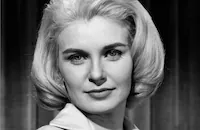The Stripper
Brief Synopsis
Cast & Crew
Franklin J. Schaffner
Joanne Woodward
Richard Beymer
Claire Trevor
Carol Lynley
Robert Webber
Film Details
Technical Specs

Synopsis
After failing to make a successful career as a dancer in movies, Lila Green joins a second-rate vaudeville act. When the show arrives in the small Kansas town where Lila spent part of her childhood, Ricky Powers, the troupe's manager and Lila's lover, skips town with their money, and Lila moves in with an old friend, Helen Baird, and her young son, Kenny. The ardent but inexperienced Kenny becomes so attracted to Lila that he breaks off with his teenaged girl friend and asks Lila to marry him. Lila's happiness is shattered when she realizes that Kenny's promises are a result of youthful infatuation. Ricky returns to offer Lila a job--performing a striptease at a stag show--and she reluctantly agrees to do the act. Kenny watches the performance and becomes so disgusted with what Lila has been reduced to that he once more proposes. She refuses, however, knowing that their marriage would never work, and she decides also to forego her career to make a new life for herself.

Director

Franklin J. Schaffner
Cast

Joanne Woodward

Richard Beymer

Claire Trevor

Carol Lynley

Robert Webber

Louis Nye

Gypsy Rose Lee

Michael J. Pollard
Sondra Kerr
Susan Brown
Marlene De Lamater
Gary Pagett
Ralph Lee
Bing Russell
Crew
Warren B. Delaplain
Margaret Donovan
Eli Dunn
W. D. Flick
Ellsworth Fredricks
Jerry Goldsmith
Curtis Harrington
George Masters
Ben Nye
Stuart A. Reiss
Meade Roberts
Norman Rockett
Alex Romero
Walter M. Scott
Walter M. Simonds
Robert Simpson
Jack Martin Smith
Travilla
Jerry Wald
Jerry Wald

Film Details
Technical Specs

Award Nominations
Best Costume Design
Articles
Louis Nye (1913-2005)
Nye was born on May 1, 1913, in Hartford, Connecticut to Russian immigrants. He began his career in theater in his native Hartford before moving to New York City to break into radio. After a stint in the Army during World War II, Nye returned to find a new medium dawning, television. His start was inauspicious, just a few appearances on the Cavalcade of Stars, but little did he realize that when he was picked up for The Steve Allen Show in 1956 that he, along with other talented comedians like Don Knotts, Tom Poston and Bill Dana, were courting stardom. The program was one of the first sketch series to take off on television. It was justly celebrated for the wacky characterizations that the cast invented, and Nye's Gordon Hathaway was no exception. Sure, his take on the country club elite was a touch prissy and effete, but Nye injected Gordon with a raffish charm and child-like sensibilty that never made the character offensive. If anything, Gordon Hathaway was endearing.
His stint on Steve Allen opened up the movie offers, the first of which, the garish Mamie Van Doren vehicle Sex Kittens Go to College (1960), was not exactly a highpoint in cinema comedy, but he soon settled into some good supporting parts in a slew of films: The Facts of Life (1960), The Last Time I Saw Archie (his best film role, a terrrific comic foil for Robert Mitchum, 1961), The Wheeler Dealers, Who's Been Sleeping in My Bed? (both 1963), Good Neighbor Sam (another great part as an inept detective, 1964), and A Guide for the Married Man (1967).
Nye's career cooled in the '70s, with an occasional television appearance (Laverne & Shirley, Fantasy Island) and mediocre flicks (Won Ton Ton, the Dog Who Saved Hollywood (1976), Harper Valley P.T.A. (1978). Eventually, he found solace in voice work for many animated shows, the most popular of them being his long run on Inspector Gadget (1985-99). Still, just when you thought he was out of the limelight, he returned as a semi-regular in the critically acclaimed HBO comedy Curb Your Enthusiasm where for two seasons (2000-2002), he was hilarious as comic Jeff Garlin's sardonic father. Give Mr. Nye his due, he left the stage near the top of his game. He is survived by his wife, Anita; and a son, Peter.
by Michael T. Toole

Louis Nye (1913-2005)
Quotes
Hey Lila! When I was a kid, did you used to kiss me goodnight?- Kenny
You're not a kid anymore.- Lila Green
You kissed me last night.- Kenny
Like I was your big sister!- Lila Green
I don't need you, Ricky, because someone has just shown me that he cares enough about me to make me care about myself. I've got me and me can take me wherever me wants to go!- Lila Green
Trivia
Notes
Working titles: Celebration and A Woman in July.

Miscellaneous Notes
Released in United States Summer June 1963
Franklin Shaffner's feature directorial debut.
CinemaScope
Released in United States Summer June 1963













